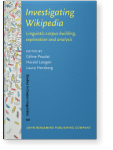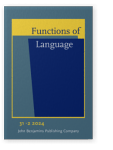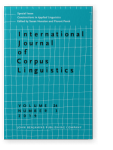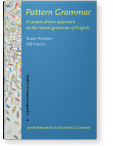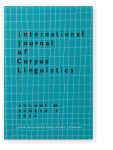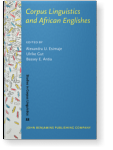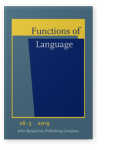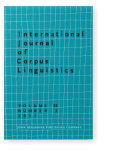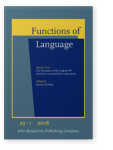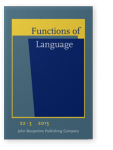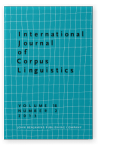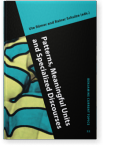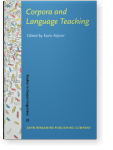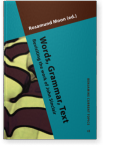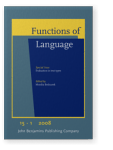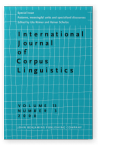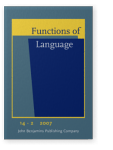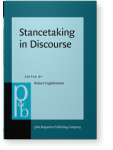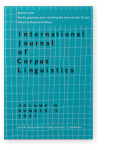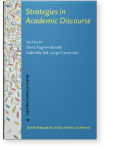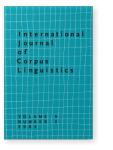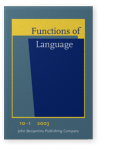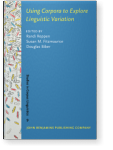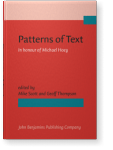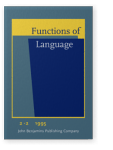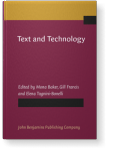Susan Hunston
List of John Benjamins publications for which Susan Hunston plays a role.
Book series
Journal
ISSN 0929-998X | E-ISSN 1569-9765
Titles
Constructions in Applied Linguistics
Edited by Susan Hunston and Florent Perek
Special issue of International Journal of Corpus Linguistics 24:3 (2019) v, 150 pp.
Subjects Computational & corpus linguistics
Pattern Grammar: A corpus-driven approach to the lexical grammar of English
Susan Hunston and Gill Francis
[Studies in Corpus Linguistics, 4] 2000. xiv, 288 pp.
Subjects Corpus linguistics | English linguistics | Germanic linguistics
2024 Assessing the potential of LLM-assisted annotation for corpus-based pragmatics and discourse analysis: The case of apology International Journal of Corpus Linguistics 29:4, pp. 534–561 | Article
Certain forms of linguistic annotation, like part of speech and semantic tagging, can be automated with high accuracy. However, manual annotation is still necessary for complex pragmatic and discursive features that lack a direct mapping to lexical forms. This manual process is time-consuming… read more
2019 Chapter 1.1. What is corpus linguistics? Corpus Linguistics and African Englishes, Esimaje, Alexandra U., Ulrike Gut and Bassey E. Antia (eds.), pp. 7–36 | Chapter
Corpus Linguistics has made great strides in language research and teaching but it is only fairly known, and thus its potentials lost, to many African academics and linguistic communities. The aim of this chapter is to introduce corpus linguistics to those African researchers and others who are not… read more
2019 Patterns, constructions, and applied linguistics Constructions in Applied Linguistics, Hunston, Susan and Florent Perek (eds.), pp. 324–353 | Article
This paper proposes an alignment between aspects of pattern grammar (Francis, 1993; Hunston & Francis, 2000) and construction grammar (Goldberg, 2006). Pattern Grammar describes the grammatical behaviour of individual words at a specific level of generality. The paper claims that grammar patterns… read more
2019 Language patterns and attitude revisited: Adjective patterns, Attitude and Appraisal Functions of Language 26:3, pp. 343–371 | Article
This paper investigates the association between language patterns and attitudinal meanings, focusing specifically on adjective complementation patterns and types of attitudes as proposed in the Appraisal framework (Martin & White 2005). The investigation shows that the tripartite division of… read more
2017 Multi-Dimensional Analysis, text constellations, and interdisciplinary discourse International Journal of Corpus Linguistics 22:2, pp. 153–186 | Article
Multi-Dimensional Analysis (MDA) has been widely used to explore register variation. This paper reports on a project using MDA to explore the features of an interdisciplinary academic domain. Six dimensions of variation are identified in a corpus of 11,000 journal articles in environmental… read more
2016 An inspiring advocate for Systemic-Functional Linguistics: Geoff Thompson (1947–2015) The Structure of the English NP: Synchronic and diachronic explorations, Davidse, Kristin (ed.), pp. 1–8 | Article
The work of Geoff Thompson, who until his death was an editor of Functions of Language, has had an international reach for over 40 years. He has contributed to advances in Systemic-Functional Linguistics, in particular extending theories of interaction and evaluation in discourse. His Introducing… read more
2015 Adjectives, communities, and taxonomies of evaluative meaning Functions of Language 22:3, pp. 297–331 | Article
From a corpus consisting of free text comments submitted to the website RateMyProfessors.com, adjectives describing people have been identified and clustered using Principal Components Analysis. This follows the Meaning Extraction method used by Chung & Pennebaker (2007). The outcome is a set of… read more
2013 McEnery, T. & Hardie, A. 2012. Corpus Linguistics: Method, Theory and Practice International Journal of Corpus Linguistics 18:2, pp. 290–294 | Miscellaneous
2010 Starting with the small words: Patterns, lexis and semantic sequences Patterns, Meaningful Units and Specialized Discourses, Römer-Barron, Ute and Rainer Schulze (eds.), pp. 7–30 | Article
2009 The usefulness of corpus-based descriptions of English for learners: The case of relative frequency Corpora and Language Teaching, Aijmer, Karin (ed.), pp. 141–154 | Article
The paper argues that some of the most interesting information about word frequency is difficult to present in a way that is useful to learners. This is particularly true when the issue is not one of absolute frequency but of frequency that is relative and dependent on complex variables. The first… read more
2009 Semantic prosody revisited Words, Grammar, Text: Revisiting the work of John Sinclair, Moon, Rosamund (ed.), pp. 85–103 | Article
2008 Review of Mahlberg (2005): English general nouns: A corpus theoretical approach Evaluation in text types, Bednarek, Monika (ed.), pp. 180–185 | Review
2008 Starting with the small words: Patterns, lexis and semantic sequences Patterns, meaningful units and specialized discourses, Römer-Barron, Ute and Rainer Schulze (eds.), pp. 271–295 | Article
This paper proposes a concept of ‘semantic sequences’, that is, series of meaning elements that can be demonstrated to occur regularly either in a general corpus or in one comprising specific types of text. Semantic sequences may be identified by examining the co-text of a lexical item such as… read more
2008 The evaluation of status in multi-modal texts Evaluation in text types, Bednarek, Monika (ed.), pp. 64–83 | Article
This paper reconsiders the concept of ‘evaluation of status’ and applies it to visual as well as to verbal texts. The paper explores the relationship between ‘status’ and other related concepts such as epistemic modality. It is argued that a conceptual notion of status is useful in analysing… read more
2007 John McHardie Sinclair: 1933–2007 Functions of Language 14:2, pp. 173–176 | Miscellaneous
2007 Using a corpus to investigate stance quantitatively and qualitatively Stancetaking in Discourse: Subjectivity, evaluation, interaction, Englebretson, Robert (ed.), pp. 27–48 | Article
2007 Semantic prosody revisited Words, grammar, text: revisiting the work of John Sinclair, Moon, Rosamund (ed.), pp. 249–268 | Article
This paper considers the contentious term ‘semantic prosody’ and discusses a number of aspects of the concept described by the term. It is pointed out that although many writers use it to refer to the implied attitudinal meaning of a word, Sinclair uses the term to refer to the discourse function… read more
2005 Conflict and consensus: Construing opposition in Applied Linguistics Strategies in Academic Discourse, Tognini-Bonelli, Elena and Gabriella Del Lungo Camiciotti (eds.), pp. 1–15 | Article
2004 The automatic recognition of verb patterns: A feasibility study International Journal of Corpus Linguistics 9:2, pp. 253–270 | Article
Patterns describe the syntactic behaviour of lexical items by specifying their local environment. This paper reports on a pilot study to automatically recognise those patterns in text. This study has been successful in producing a system that identifies patterns using only limited linguistic… read more
2003 Lexis, word form and complementation pattern: A corpus study Functions of Language 10:1, pp. 31–60 | Article
This paper examines the comparative frequency of two complementation patterns (that-clause and wh-clause) with the different wordforms of twenty-six verb lemmas. It is found that in the majority of cases the patterns co-occur differentially with the different word forms. In particular, the… read more
2002 9. Pattern grammar, language teaching, and linguistic variation: Applications of a corpus-driven grammar Using Corpora to Explore Linguistic Variation, Reppen, Randi, Susan Fitzmaurice and Douglas Biber (eds.), pp. 167–183 | Chapter
2001 Colligation, lexis, pattern, and text Patterns of Text: In honour of Michael Hoey, Scott, Mike and Geoff Thompson † (eds.), pp. 13–33 | Article
Editors’ introductionOne purpose in analysing a large corpus of texts, exemplified by Scott in this volume, is to focus on what the texts are about: to see the corpus as reflecting the concerns of the society which produces the texts. Another, complementary, purpose is to focus on how the texts are… read more
1995 A corpus study of some English verbs of attribution Functions of Language 2:2, pp. 133–158 | Article
With some verbs of attribution, a typical usage can be identified which indicates a particular evaluation. This typical usage can be exploited to implicate evaluation in non-typical cases, a phenomenon which is analogous to that of semantic prosody. ACKNOWLEDGE and INSIST are examples of verbs of… read more
1993 Professional Conflict — Disagreement in Academic Discourse Text and Technology: In honour of John Sinclair, Baker, Mona, Gill Francis and Elena Tognini-Bonelli (eds.), pp. 115–136 | Article
